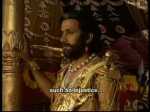Amba was dead, to be born later as Shikhandi in the kingdom of Panchal.
Meanwhile, in Hastinapur, Vichitraveerya was married to Ambika and Ambalika. As was suspected, there was something lacking in Vichitraveerya that kept him from fulfilling the duties of a king in the court and a husband in the bedroom. But Satyavati was determined to see a great line of kings coming from him. She waited and waited. And waited.
One ‘unfine’ day, Vichitraveerya died of a strange disease, without leaving an heir behind. Satyavati’s dreams were in turmoil. The drastic measures that she and her father had taken to assure that her lineage ruled for generations had been rendered fruitless. Hastinapur did not have an heir; she did not have a grandson. Bheeshm, who had sacrificed all pleasures of the world to remove all conflicts in inheritance, was equally aghast.
Satyavati summoned Bheeshm one day. She told him that the need of the hour was that Bheeshm broke his oath of celibacy, got married and gave Hastinapur its heir. But Bheeshm could not make this deal for anything in the world. The oath, that was the basis of his father’s marriage with Satyavati was now an integral part of his life. He was not living a life of his own, he was living a life for Hastinapur. It was an oath he was living.
When nothing worked, Satyavati saw sense in only one solution. That was Niyog. (For more details on Niyog, click here). She summoned her pre-marital son, Ved Vyas, upon agreement with Bheeshm who saw sense in it as Hastinapur was left with no other option. She ordered Vyas to perform Niyog on both the queens to give them sons. Vyas agreed with it but requested for a period of one year, as his long years in forest had made his body rough and hair matted. The queens could faint at the first sight of a dark ugly hermit. But Satyavati could not wait any longer. She ordered that the process be completed at the earliest.
So, on orders of his mother, Vyas went to Ambika to bear a son on her. She was so horrified at his first sight that she shut her eyes tightly. Now Vyas was a sage, and sages had a hit rate of 200! Of course a son was born, but it was born blind. He was named Dhritrashtra.
Dissatisfied with the first output of the Niyog, Satyavati sent Vyas to Ambalika. Since she knew what happened with Ambika, she did not close her eyes, but the sight of Vyas turned her pale. The son, thus born was pale in appearance. He was named Pandu.
Still dissatisfied that none of the sons were completely healthy, Satyavati sent Vyas again to Ambika. This time the room was kept dark so that Ambika would not have to see Vyas’ face. She would not have had to anyway, as she had sent her maid instead. But Vyas did what he was told to do, irrespective of who was on the receiving end. Contrary to how the two queens had reacted, the maid welcomed Vyas with open arms and without any fear. The son thus born was completely healthy. He was named Vidur. However, he could never become a king as he was born of a maid and not of a queen.
So you see how things are shaping. Satyavati’s dreams were shattered. The sons who could sit on the throne were not completely fit. The one who was born fit could not sit on the throne. Time and again, the throne was calling for its rightful owner, the one who truly deserved to be the king, the last of the Kuru blood, the mightiest of all, the most deserving one – Bheeshm. Satyavati regretted what had happened, but it was too late. Bheeshm would not go back on his oath and Hastinapur would not get a capable king. Poor Hastinapur!


